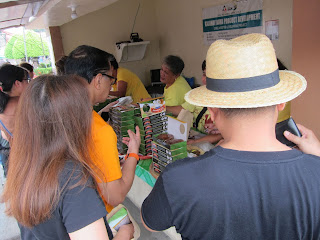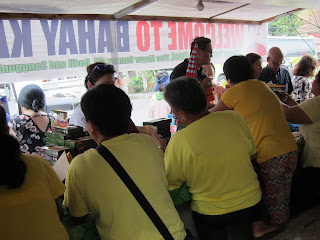Indang is known to be a first class municipality in the province of Cavite. The municipality is in the central part of Cavite Province approximately 12 km from Tagaytay ridge. It is composed of 36 barangays and highly accessible through major points and boundary places like Alfonso, Amadeo, Naic, Trece Martires City, Mendez, and Tagaytay City.
Indang (originally called Indan) was established as town in 1655, when it was administratively separated from the nearby town of Silang, Cavite. Indang derived its name from the words “Inrang” or “Yndan”, a tree which was also called “Anubong” The tree of Inrang was used to be abundant in the local since the early times. Indang is known as the home of Cavite State University Severino de las Alas Campus.
Culinary Historians of the Philippines (CHOP) is a Manila-based non-profit sister organization of the Culinary Historians of Washington, D.C. (CHoWDC). Members are not historians in the academic or scholarly sense of the word but students of culinary history, food ways, and gastronomy who want to give back to society through culinary-based activities and advocacy programs.
Meeting place was at Blue Bay MOA and the tour guide organizer is none other than the current CHOP President Mr. Ige Ramos.
CHOP Indang Cavite Food Tour was held last June 6, 2018.
Meeting place was at Blue Bay MOA and the tour guide organizer is none other than the current CHOP President Mr. Ige Ramos.
Here he is giving a short brief description about Indang and where we will go.
1st STOP : Baraka in Pamilihang Bayan ng Indang
Palengke day in Indang or baraka is held every Wednesday and Saturdays only. According to Sir Ige there are more people during weekend.
There are so many kalamay stalls
My favorite buchi P25 for 5 pieces
Nilupak, Sapin-Sapin, atbp
Giant steamed puto as big as a bilao
Pinipig and Colorful Sagos
Shrimps
Crabs
Another variety of crabs
Mussels
Plants for sale
Chicharong Kalabaw - I miss this so bought two packs
Sunflower seeds !!!
Masarap ang tinda ni lola than those supermarket sold.
Masarap ang tinda ni lola than those supermarket sold.
Dried Fishes
Fruits and Vegetables
Pineapples and Mangoes
Watermelons
Eggplants, Calamansi, Ampalaya, Onions, Carrots, Peppers, Garlic, Potatoes and Sayote
Turnips and Camote
More root crops and green veggies
Bananas
This Banana is called Murado. May saging na pula pala first time seeing it :)
Bought this piling at home. Tasted like Lakatan - Yummy !
There are several Japanese surplus shops at one side and here is a sample of what they are selling at a cheap price.
2nd STOP: Parish of San Gregorio Magno and Indang Town Plaza
We parked at the Parish of San Gregorio Magno, one of the oldest Church in Cavite.
The church was closed that time.
Walking across the a mini park/plaza fronting the old town hall which was built during American period.
The Indang old town hall.
It was well preserved as a town museum and tourism office but like the church it was not open when we came unlike during the AHP Tour I had been to before that we were able to roam inside. You can see some of inside photos of the church and town hall in my previous AHP tour blog entry. Hats of to the officials for having the heart and passion to continue preserving the beautiful past for the future generations.
Beside the town hall is the Kalamay Buna now renamed Kalamay Indang pasalubong center.
Kalamay making in Indang is an old industry. This traditional kakanin is sweet and chewy. made of glutinous rice, coconut milk, brown sugar, and young coconut.
Kalamay shopping
The Department of Labor and Employment Regional Office IV-A, in cooperation with Cavite Provincial Cooperative, Livelihood and Entrepreneurial Development Office, sponsored the Kalamay Buna Product Development and assisted the Samahan ng Magkakalamay ng Buna Lejos to improve their livelihood project.
There are two kinds of Kalamay Indang: malambot and the makunat
There makunat is limited edition. I forgot to take the photo of the makunat which is also my favorite. Lifespan of Kalamay Indang is two weeks even if not refrigerated.
3rd STOP: Mahabang Kahoy Cooperative Barangay Hall, Mahabang Kahoy Cerca
Indang was once a weaving center. Cotton, abaca, and maguey would to grow abundantly in the area. After the second world war, the weaving industry slowly waned and in the 70’s died.
What they are selling and in terms if quality are bargain compared to the ones sold at malls.
Hinabi shopping
Sadly the the cooperative is now being evicted from its location because the new barangay captain elected was not in support of the project. Hopefully the cooperative will be able to relocate somewhere where they can continue weaving and selling the Filipino traditional product.
4th Stop: Sanctuario Nature Farms
A short briefing about the farm tour
We were divided into two groups for the guided tour
The farmer guide thought us permaculture and tips on compost
Bamboos plays an important role in their farming process.
African worms which they import and used in making fertilizers
More worms
Where the fertilizers are being made
The manure the worms leaves that is used to fertilize the farm product plants.
They make their own pesticides from vegetables and molasses
Organic Pesticides
Michelle our farm tour guide.
Where materials are being prepared
Mixing Area
We also toured the organic chicken in their cages.
A big imported rooster they use for crossbreeding
Those fat chickens
Kukurukukuku
More chickens
Nursery
As much as I am tempted to buy potted herbs, none survived of the batch I bought last year from a Silang farm. Cavite City is really not an ideal area for planting anymore. I should try plants next time that are more susceptible to weather changes.
Tomatoes
Lettuce
Alugbati abundantly grown near the entrance
And its lunch time !!!
Salad greens freshly picked from the farm
More salad greens
A little lecture about the salad ingredients
It was my first time seeing some of the produce
Edible flowers and cute pipinito
Local spinach I forgot the name

Pancit
Binalot and Señorita Banana
Blue Ternate, Tarragon and Lemon Grass Drink
Lucciole Farms Native Lechon de Leche was sooooo yummy. The best tasting lechon.
Super Sarap !!!!
Ceremonial pig chopping
It looks like a gift with tag - creatively wrapped.
Adobo, Fresh Tomatoes, Boiled Egg, Atsara, Mangga't Bagoong
My plate with a little of everything
Galit-galit muna
Sir Ige's newly published book about Cavite cuisine
Our take home giveaways - fresh herbs

Goodbye Santuario for now. Would love to see you again soon for a more detailed farming lecture hopefully.
This far is promising and has a lot of business potential with more improvement and marketing.
5TH STOP: Cavite State UniversityThis far is promising and has a lot of business potential with more improvement and marketing.
National Coffee Research, Development and Extension Center (NCRDEC) was created in 2005 and started to link with other agencies to promote the development of the coffee industry in the country.
Coffee Museum
The Coffee Museum in Cavite State University (CavSU) Don Severino delas Alas Campus houses a vast collection of different varieties of coffee all over the Philippines including the Arabica, Robusta, Liberica, and the Excelsa varieties.
Many varieties of not yet big name coffee brands
Types of Coffee Beans
Upstairs are some student artworks
Coffee Museum houses the National Coffee Research and Development Center or NCRDEC.
NCRDEC 3d model
The area was very huge with so many trees and plants
Waiting for freshly brewed cup of coffee
Freshly brewed coffee
Sir Ige discussing what we will do inside the campus
Outside tour at the coffee trees plantation area
Sir Ige guiding us around the coffee farm
Guess the three star chefs walking here ahead of everyone else
Too bad coffee season is October so there was barely any fruit to see.
Pepper plant
Fresh paminta - di sanay ng madaliang macro shot LOL
More varieties of coffee trees as we walk along.
Coffee trees are all documented for research purposes.
Coffee Nursery
Warehouse
Grafted Coffee Trees
The research area facility which is just beside the other products production area.
.
And our coffee lecture started ...
The facilities serves trainings, seminars, and workshops on coffee production and processing. They also conduct coffee related researches and production and distribution of quality seedlings, green, roasted and ground coffee and vermicompost.
Coffee research process
More lecture about coffee
Variety of coffee beans
Coffee Palette - From light to darkest roast
Darkest
Coffee roasting machine
Coffee Variety Smelling Test
And that ends our coffee lecture.
We also visited the food processing technology center where they produce kaong vinegar, kamias jam, salabat powder, macapuno and juices.
Freshly grated macapuno
Aguinaldo Blend Coffee
Juices Production Area
Pasalubong Product Area
Indoor coffee drying bed and other equipments that are used for lecture purposes
May nagaganap na pagpupulong while waiting for the kaong vinegar orders
Waited for my kaong vinegar which kuya promised but when I claim mine ubos na daw sa iba binenta. Sensya na daw. Paasa si kuya. After much brag about na its masarap di ko natikman maybe next time matikman ko na rin.
Its a kulimlim day but good thing the weather cooperated in the entire tour.
And that wraps up our Indang Tour
Overall my realizations in this tour ...
This Indang market area section was newly build. How I wish the Cavite Public market will be like this clean and organized someday. Nakakainggit !!!
It always feels good to pause and give a short prayer of thanks especially in old churches.
Weaving is a very very hard. No wonder it is a dying industry.
Hope we can continue this dying tradition alive. Kudos to Indang people.
Hope we can continue this dying tradition alive. Kudos to Indang people.
There is joy and money in farming.
Hats off to these two girls Michelle and Francelle for their tremendous passion in farming. I hope there will be more young souls like them in every area in our country. We should bring back love for farming among the youth.
The best tasting lechon I ever tasted so far - Lucciole Farms native black lechon de leche
I never knew there is that much variety of coffee pala - WOW !
Thank your CHOP, its very friendly members and Sir Ige til the next gastronomic tour.
Group Photo credit : Patrick Ilano
Mabuhay ang Indang !!! Mabuhay ang Cavite !!!


















































































































































































This article made me a proud Indangueño.
ReplyDeleteThe food that is considered to be good for your health is called health foods. They are beneficial to our health. They are usually categorized into organic or natural food. The organic foods are usually grown without the use of insecticide or chemical fertilizers and the natural foods are also processed without making use of chemical additives. The popular natural food includes bone meal, nuts and seeds, vegetable juices and yogurt. what chinese food is good for diabetics
ReplyDeleteYum
ReplyDelete